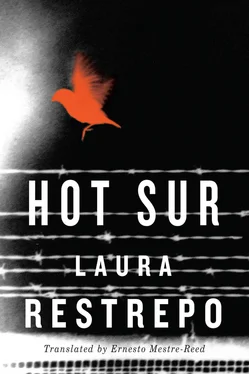Laura Restrepo - Hot Sur
Здесь есть возможность читать онлайн «Laura Restrepo - Hot Sur» весь текст электронной книги совершенно бесплатно (целиком полную версию без сокращений). В некоторых случаях можно слушать аудио, скачать через торрент в формате fb2 и присутствует краткое содержание. Год выпуска: 2015, Издательство: AmazonCrossingEnglish, Жанр: Современная проза, на английском языке. Описание произведения, (предисловие) а так же отзывы посетителей доступны на портале библиотеки ЛибКат.
- Название:Hot Sur
- Автор:
- Издательство:AmazonCrossingEnglish
- Жанр:
- Год:2015
- ISBN:нет данных
- Рейтинг книги:5 / 5. Голосов: 1
-
Избранное:Добавить в избранное
- Отзывы:
-
Ваша оценка:
- 100
- 1
- 2
- 3
- 4
- 5
Hot Sur: краткое содержание, описание и аннотация
Предлагаем к чтению аннотацию, описание, краткое содержание или предисловие (зависит от того, что написал сам автор книги «Hot Sur»). Если вы не нашли необходимую информацию о книге — напишите в комментариях, мы постараемся отыскать её.
María Paz is a young Latin American woman who, like many others, has come to America chasing a dream. When she is accused of murdering her husband and sentenced to life behind bars, she must struggle to keep hope alive as she works to prove her innocence. But the dangers of prison are not her only obstacles: gaining freedom would mean facing an even greater horror lying in wait outside the prison gates, one that will stop at nothing to get her back. Can María Paz survive this double threat in a land where danger and desperation are always one step behind, and safety and happiness seem just out of reach?
Hot Sur — читать онлайн бесплатно полную книгу (весь текст) целиком
Ниже представлен текст книги, разбитый по страницам. Система сохранения места последней прочитанной страницы, позволяет с удобством читать онлайн бесплатно книгу «Hot Sur», без необходимости каждый раз заново искать на чём Вы остановились. Поставьте закладку, и сможете в любой момент перейти на страницу, на которой закончили чтение.
Интервал:
Закладка:
Bolivia said that America smelled clean but what really smelled clean was her, my mother. She was always pretty and fresh, as if she had just stepped out of the shower. Even during the dog days of summer, Bolivia smelled clean and young. She smelled like breakfast on a checkered tablecloth in the courtyard, although we never had a courtyard, or come to think of it a checkered tablecloth, and as I’ve said before my mother’s own body was foreign to us; there was something about it that wasn’t domestic, that opened outward, like a window that remains open at night and leaves the house exposed. That was Bolivia, she killed herself to provide four walls and a roof to shelter us, and at the same time made the space vulnerable by leaving the door open. This seems like a mess, all this I’m writing you; but deep down I just want to say something simple, let’s say it was on a weekday, on a Wednesday morning, already in America, the three of us finally together, my mother, my sister, and I, pretending we knew each other well, that in spite of everything we were a family, let’s say that seated at the breakfast table, our dream had been fulfilled, because although we didn’t have a checkered tablecloth, we did have orange juice and cornflakes and chocolate milk, those things that make up the well-being of a mother and two daughters, hurrying to get to school. Then suddenly, from Bolivia’s darkened room some guy emerges, his hair all on end, half-naked, after just waking up, his eyes still heavy with sleep. And at that moment in a festive voice, Bolivia would say something like, Girls, this is Andres, or This is Nate, or This is Jonathan, come here, please, splash some water on your face, I’m going to introduce you to my daughters, this is María Paz and Violeta, a pair of adorable girls, now that we’re finally all together, I want to assure you that from now on things are going to be fine for the four us, a real close family. Come, sit with us, Andres, or Nate, or Jonathan, let’s have breakfast together, you’ll see how dandy it will be for us as a family. A week later, Bolivia would be already married, or living together, but in six or seven months, Nate’s or Jonathan’s shirts and underwear would not be on the shelves, instead those of Andres or Mike would be there, which in turn would also disappear, and the shelves would remain empty so some other man could put his clothes there. And so on, successively. Do you know what I’m talking about now?
She liked to dress in white, Bolivia did, when we were poverty-stricken and later, when that wasn’t so much the case. If she wasn’t in white, she wore light colors: lilac, sky blue, pink. In America, she worked fourteen-hour days every day until the day she died, and she was still able to smell like a garden. She indulged in an extravagant luxury for a woman of her means, Heno de Pravia soap, which according to her whitened the skin and made it silky. Heno de Pravia could never be missing from the house; there would be no sugar in the sugar bowl or bread in the basket first. When Bolivia left us in Colombia, I imagined America smelled like Heno de Pravia. I yearned desperately for her and thought America would smell like her. Of course, when we got to America, I realized that there were things about Bolivia that as a teenager embarrassed me. For example, well dressed as she was, she was never able to get the American casual look right. Imagine if your mother ever showed up at a parent-teacher conference with an orchid corsage pinned to her lapel, tell me if you wouldn’t want the earth to open and swallow you. That’s what I’m talking about, that type of thing. Suffice it to say that Bolivia never bought a single item of clothing at an American store, no, not her, God forbid. Until the end of her days, she remained loyal to a neighborhood store where the clothes were custom sewn. It was named Las Camelias, Prendas y Accesorios para Damas, just like that in Spanish, so you get my drift about her.
I’m curious about how you are going to depict me in the novel. Physically, I mean, how you are going to portray me in that sense. We are now too far away from each other and you cannot see me, and I doubt that back then you looked at me closely, or that you even looked at me. You did notice the skewed ways I had of looking at things, you were surprised by my way of thinking, sometimes my writing exercises made you laugh. And I was the know-it-all who responded first to all your questions. But did you ever pay attention to the way I looked, my physical aspects? Could you tell I was ill? This hemorrhaging that doesn’t stop had already started then. One time I almost fainted in class, right in front of you, and I think the loss of blood made me hallucinate. But I faked it, I played it off as if it wasn’t anything and put up a front, which wasn’t too hard in this place in which the women look either sick or mad. And I wasn’t going to let my ailments stop me from going to class; I wouldn’t have missed one of your classes or an episode of House for anything in the world. So take note, Mr. Rose, the main thing about my appearance is that the hemorrhaging has left me baggy-eyed as a vampire’s girlfriend and gaunt as a punk rocker. The second important element about my appearance is my Latino air. I was one of six Latinas who took your class, and maybe some others had wanted to sign up as well but didn’t know enough English. This had become an issue ever since the warden had prohibited the use of Spanish, the guards intimidating us when they heard us speaking our own tongue. “This is America,” they shouted. “Here you speak English, or you shut the fuck up.” And even the Latino guards, bastards, traitors, played along and didn’t respond if you asked them something in Spanish. We screamed at them that they were sellouts and they screamed, “Go get fucked, you motherfuckers.” Although the fact is that there are not many Latino guards here. The prisoners are almost all dark-skinned and the guards are almost all white. And the shits in the warden’s office have decided that even visiting hours had to be conducted in English. Here visiting hours are from behind a glass partition with a microphone, so the authorities can monitor everything you are saying and of course, they can’t understand Spanish. Who do they think we are anyway? What do they want us to speak in, Greek? The glass prevents touching: no hugs, kisses, not even the graze of a hand. And now, on top of this, they violate you by forcing you to speak in a language that’s not yours, a language that your people don’t even know how to speak.
Visiting day has always been a delicate matter. At 5:00 p.m. the families leave, taking with them any illusion of warmth and affection, and the inmates return alone, freed into our cold reality. Some minutes later, around 5:15 or 5:20, begins the worst part of life in jail, because the prisoners tend to commit acts of desperation. It’s as if they had been emptied inside, grown even more desolate than before, as if their hearts, softened by the visit from loved ones, become more vulnerable to solitude. Sometimes it’s stabbings. Or beatings, rapes, that sort of thing. But not just that, which doesn’t happen every day; I’m talking more about gratuitous acts of intimidation. Imagine that apropos of nothing someone I haven’t even noticed, who has no relation to me, passes by and shoves me, or knocks my tray from below so all the food goes flying in the air, or grabs my ass, or lets out some obscene insult. It’s not as serious as a stabbing, and it likely isn’t serious at all, physically, I mean, but it strikes a chord, sets my nerves on edge, and triggers alarms in my head because it is clearly letting me know that a person detests me, doesn’t support me, and would feel better if I weren’t around. Why? Just because that person feels I’m stealing her air. The feeling of suffocation is constant in here. Air doesn’t circulate in these closed spaces, and you have to fight for every drop of oxygen against the others. Let’s say that person has pushed you or bit your lips. In the struggles between prisoners, it could be that one rips off another’s lips with her teeth, what they call a Swiss kiss here. That person is letting you know that you are reducing her space, that you exacerbate the desperation that is already inside her. That’s why on Saturdays, after the visitors leave, the best thing to do is to take cover, make yourself invisible in some corner, don’t mess with anybody or try to fix anything that ain’t broke. And to make the shit even worse, the authorities have decided that the visits need to be in English, no Spanish, and those who don’t obey get their microphones turned off. And there are the poor families, Mexicans, Puerto Ricans, Colombians, that often come from afar, that don’t speak a word of English and begin to cry helplessly when they’re forbidden from speaking Spanish with daughters they can only see through bulletproof glass. Words are forbidden, and so are hugs: they destroy all form of communication, so that fierce frustration and anxiety are all that lingers in those looks crossing from side to side, those hands that want to reach through the glass between them. I know what a visit means for a prisoner even though no one has visited me here. For some in here, the encounter with a loved one is reason for living, sustenance hour after hour, the only hope of the entire week. If they take that away from you, the only thing you want to do is die or kill someone. The banning of Spanish has been the worst, Mr. Rose, the most difficult thing of all, an injustice that rips away at the guts. People outside have become aware, and human rights groups have filed complaints. Mandra X, who is our inmate representative, has made sure the matter is being shouted from the rooftops, and the scandal is making the rounds in newspapers. That’s why the warden of this dump has begun to make accusations. She has said that we Latinas use our native language to traffic and make illegal pacts with family members, unnoticed by authorities. Or as Jennings said the other day, “Who’s to say that when you speak Spanish you’re not ordering a hit from the outside?” One of us responded, “Your mother might be a killer, but mine is an honorable little old woman.” Jennings, that garbage-digging rat, I don’t know why I have a feeling her days are numbered. The authorities also claim that we use Spanish to insult the guards without them knowing it. Imagine, coming up with such things, although they have a point because it’s true that in English, all of us respond, “Yes, ma’am, no problem, ma’am, I’m sorry, ma’am, I won’t do it again, ma’am.” But in the next line we mutter under our breath in Spanish to “stick it up your ass, you old bitch” or “eat shit, you filthy whore.” That is, there is no doubt that the guards are assaulted with a good motherfucker, or gross insult, or low blow, depending on whether the inmate is Mexican, Argentine, or Colombian, because here Spanish is defended in all its versions: in Argentine che , in Salvadoran guanaco , Guatemalan chapin , and Honduran catracho , in Nicaraguan nica , and Costa Rican tico , in all the Colombian versions of paisa, rolo, costeño , and veneco , in boricuan , in newyorkrican, chicano , and the Mexican chilango .
Читать дальшеИнтервал:
Закладка:
Похожие книги на «Hot Sur»
Представляем Вашему вниманию похожие книги на «Hot Sur» списком для выбора. Мы отобрали схожую по названию и смыслу литературу в надежде предоставить читателям больше вариантов отыскать новые, интересные, ещё непрочитанные произведения.
Обсуждение, отзывы о книге «Hot Sur» и просто собственные мнения читателей. Оставьте ваши комментарии, напишите, что Вы думаете о произведении, его смысле или главных героях. Укажите что конкретно понравилось, а что нет, и почему Вы так считаете.












